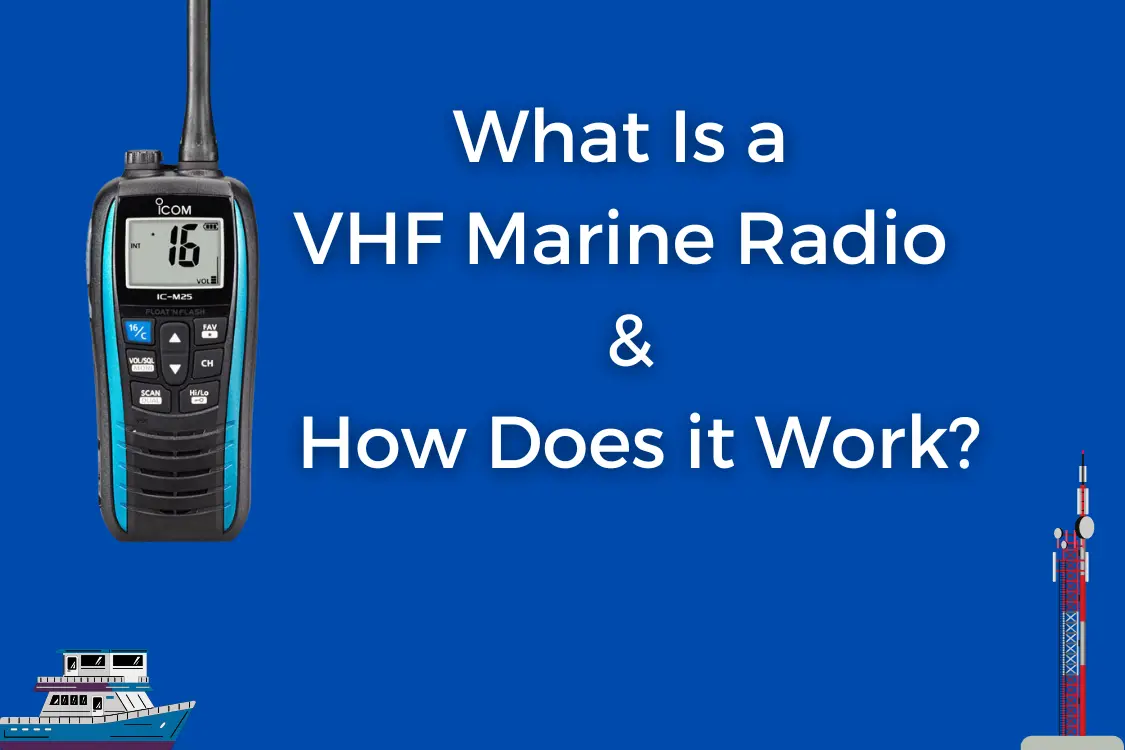
If you’re out on your boat, you’ll need communication when a cell phone signal fails you out on the water. A VHF marine radio might save your life if something goes wrong. So, what is a VHF marine radio?
A Very High Frequency (VHF) Marine Radio is a radio device that allows for instant communication between a boat and Other boats, Bridges, Marinas, The coast guard and The National Oceanic and Atmospheric Administration (NOAA) weather forecast.
Now that we know the VHF marine radio, you must know how it works. Keep reading to see its range, how to operate it and which channels to use.
What Is the Range of a VHF Marine Radio?
Many different stores that sell marine radios will tell you their maximum range, but most of the time,
the reality is quite far off from the initial promise.
VHF radio waves are transmitted by line-of-site and can travel approximately 60 miles if hills, mountains, or other large objects do not block the signal. If the line-of-site is blocked, a VHF marine radio will be unable to reach its full range.
How Does a VHF Radio Work?
VHF radios are fairly simple to use, making communication between boats, marine vessels, and buildings very convenient. But how do you operate a VHF marine radio?
Here are some steps:
- Step 1: Ensure that you are on the right channel
- Step 2: Adjust the squelch control (the knob that adjusts the gain of the amplifier) so that it is at its minimum. Make sure you do not hear static.
- Step 3: Hold down the button on the microphone to send a broadcast, and speak in your usual voice.
- Step 4: Release the button on the microphone to hear the other person speaking.
Also, Read Do Walkie-Talkies Work On a Cruise Ship & Single DIN VS Double DIN
There are YouTube videos that exist to show how a VHF marine radio operates, we recommend researching them if you are still confused after reading this article.
Find out the best VHF Marine Radios for boats.
Channels to Use for the VHF Marine Radio
There are nine main channels to be aware of when using VHF marine radio channels. Each channel has a specific function, so knowing which one to use in different situations is beneficial.
Here are the different channels explained:
- Channels 68, 69, 71, 72, and 78A are for non-commercial ships and boats. These are working channels and provide communication for ship-to-ship and ship-to-shore transmission.
- Channel 22A is only available for the United States Coast Guard (USCG). You may hear announcements on other channels to switch to Channel 22A to receive critical information.
- Channel 16 is restricted for emergency and distress calls.
- Channel 13 is the way to communicate between vessels and bridges. This channel is usually used to request a bridge opening for a vessel. In situations with low visibility, it’s a great way to communicate with bigger vessels, but you’ll need to use this in low-power mode on your radio.
- Channel 9 is the primary calling channel because this is the channel you will first use to establish contact with your radio. Once this is done, you need to move to a working channel.
Now, let’s see if you’re required to have a VHF marine radio if you’re on a boat.
Am I Required to Have a VHF Marine Radio?
So you plan to go on a fishing trip in a little canoe. Do you have to have a VHF marine radio?
Any recreational vessel that is smaller than 65.5 feet long is not legally required to have a VHF marine radio.
Having said that, they are still the best means of communication across bodies of water. You can have a VHF marine radio on a recreational vessel under 65.5 feet, but you will not need a license to use it.
What Do I Do If I Hear a Distress Call On VHF Marine Radio?
Some people hear distress calls and think, “That’s not my business,” and some think, “I need to help out!” But really, what are you supposed to do if you hear one?
If you witness a distress call, you are required to answer it if there is no answer.
If the vessel in distress is not in an area close to you, it’s always best to wait a while to see if other people who might be closer answer the call.
VHF Marine Radio: Final Thoughts
Having a VHF marine radio on recreational boats might not be required, but it will always be an asset. You never know what could happen out in open water.
It’s always a smart idea to have an open and instant line of communication and 24 hours of access to the weather forecast. Conditions and situations on the water can change faster than you can say “storm.” So be prepared for anything with a VHF marine radio.